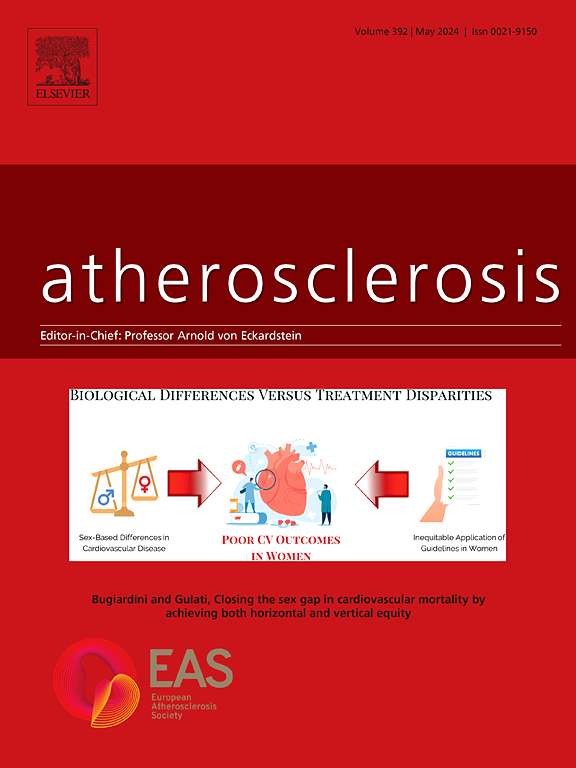肠粘膜通透性增加和代谢性内毒素血症可预测心血管死亡风险
IF 4.9
2区 医学
Q1 CARDIAC & CARDIOVASCULAR SYSTEMS
引用次数: 0
摘要
背景和aimslow级慢性炎症是动脉粥样硬化性心血管疾病(ASCVD)的一个致病因素,但其潜在机制尚不清楚。我们的目的是探讨肠通透性和随后的代谢性内毒素血症作为心血管死亡的危险因素的作用。方法从赫尔辛基商人研究(HBS)中随机抽取1919年至1934年出生、自1964年开始随访的家庭生活参与者,分别于2003年(n = 632)、2011年(n = 316)和2017年(n = 82)进行回顾性分析。测量了代表肠通透性和内毒素血症的六种生物标志物,并将结果与ASCVD患病率、传统危险因素和死亡率的广泛数据相结合。结果在整个15年的随访期间,观察到zonulin、脂多糖结合蛋白(LBP)和肠道脂肪酸结合蛋白(I-FABP)在个体水平上的相关性。这些生物标志物是高度相关的。特别是zonulin,一种肠通透性的标记物,与大多数传统的ASCVD危险因素相关。没有一项生物标志物与流行的ASCVD相关,但较高水平的zonulin和LBP与10年冠状动脉疾病死亡风险相关(CAD,年龄调整p <;分别为0.001和p = 0.006)。结论本研究结果支持代谢性内毒素血症是动脉粥样硬化性心血管疾病的一个致病因素,具有不良后果。在研究的替代生物标志物中,zonulin是最可靠的CAD死亡率预测因子。在15年的随访中,zonulin、LBP和I-FABP水平在个体中保持相对稳定,这表明它们可能作为ASCVD风险的生物标志物。本文章由计算机程序翻译,如有差异,请以英文原文为准。

Increased intestinal mucosal permeability and metabolic endotoxemia predict the risk of cardiovascular mortality
Background and aims
Low-grade chronic inflammation is a pathogenetic factor in atherosclerotic cardiovascular diseases (ASCVD), but the underlying mechanisms are not well understood. We aimed to explore the role of intestinal permeability and ensuing metabolic endotoxemia as risk factors for cardiovascular mortality.
Methods
A random sub-cohort of home-living participants from the Helsinki Businessmen Study (HBS), born between 1919 and 1934 and followed since 1964, was recalled in 2003 (n = 632), 2011 (n = 316) and 2017 (n = 82). Six biomarkers representing intestinal permeability and endotoxemia were measured and the results were combined with extensive data on ASCVD prevalence, conventional risk factors, and mortality.
Results
Correlation on the individual levels was observed for zonulin, lipopolysaccharide-binding protein (LBP), and intestinal fatty acid-binding protein (I-FABP) across the entire 15-year follow-up. These biomarkers are highly intercorrelated. Particularly zonulin, a marker of intestinal permeability, correlated with most of the conventional ASCVD risk factors. None of the biomarkers correlated with prevalent ASCVD, but higher levels of zonulin and LBP associated with 10-year risk of death from coronary artery disease (CAD, age-adjusted p < 0.001 and p = 0.006, respectively).
Conclusions
The results support metabolic endotoxemia as a contributing pathogenetic factor in atherosclerotic cardiovascular disease with an adverse outcome. Of the surrogate biomarkers studied, zonulin was the most robust predictor of mortality in CAD. Levels of zonulin, LBP, and I-FABP remained relatively stable in individuals over the 15-year follow up, suggesting a potential role for them as biomarkers for ASCVD risk.
求助全文
通过发布文献求助,成功后即可免费获取论文全文。
去求助
来源期刊

Atherosclerosis
医学-外周血管病
CiteScore
9.80
自引率
3.80%
发文量
1269
审稿时长
36 days
期刊介绍:
Atherosclerosis has an open access mirror journal Atherosclerosis: X, sharing the same aims and scope, editorial team, submission system and rigorous peer review.
Atherosclerosis brings together, from all sources, papers concerned with investigation on atherosclerosis, its risk factors and clinical manifestations. Atherosclerosis covers basic and translational, clinical and population research approaches to arterial and vascular biology and disease, as well as their risk factors including: disturbances of lipid and lipoprotein metabolism, diabetes and hypertension, thrombosis, and inflammation. The Editors are interested in original or review papers dealing with the pathogenesis, environmental, genetic and epigenetic basis, diagnosis or treatment of atherosclerosis and related diseases as well as their risk factors.
 求助内容:
求助内容: 应助结果提醒方式:
应助结果提醒方式:


